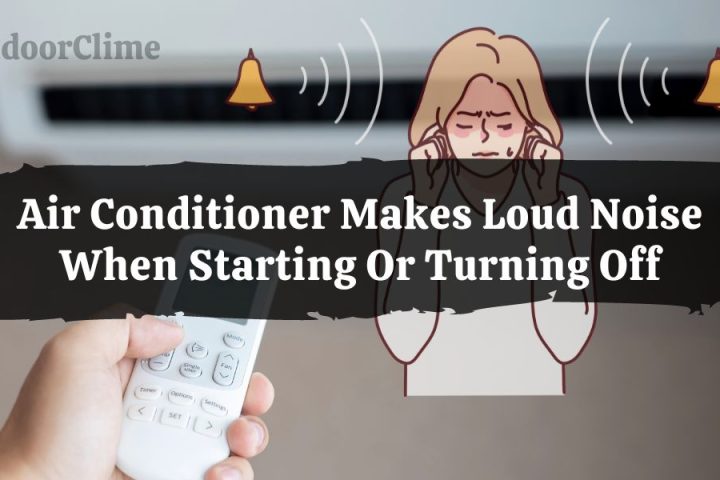The air conditioner is a blessing on a hot summer day. It keeps you cool, comfortable, and ready for anything. But it can be puzzling and frustrating when that water starts leaking from your air conditioner.
If you’re seeing water leaking from your AC unit, likely three problems are causing this: Your condensate drain line has become clogged, your coil is freezing up, and your AC unit is not level.
Here’s everything you need to learn about why your air conditioner leaks water and how to stop it.
How Does My AC Work, And Why Does It Form Water?
Your AC works by drawing heat and moisture out of the air in your home and replacing it with cooler air. As your AC cools the air in your home, it drains the water, so you often see water dripping from an AC unit.
- AC cools down air using a process called evaporation.
- Evaporating occurs as liquid changes its state to become a gas (like water becoming steam), cooling down.
- The refrigerant passes through the coils cooled by the surrounding air.
- It absorbs heat from the surrounding air and evaporates as it does this.
- The cold air from the locks is blown through vents throughout your home.
So, where does this water come from? The short answer is that water forms when your AC condenses the moisture in the air. As your AC pulls hot air from your home, it lowers its temperature and causes it to thicken. This condensed water drips out of your AC unit.
When an AC unit runs out of water, it forms more to maintain its cooling effects. When exposed to colder temperatures, the liquid inside condenses into vapor; this vapor then returns to liquid form once it reaches warmer environments.
When Is It Normal For My AC To Drip Water?

If your air conditioner is dripping water, it’s not a cause for concern, so don’t panic—it’s normal!
The condensate system is part of your AC that collects and drains away excess water. It consists of a condensate pump or drain line and a condensate drain pan. The pump or line moves the water outside of your home.
Once the air starts to flow, some moisture will collect on the evaporator coils inside your AC unit and run off into the condensate pan and then into the drain line or pump, where it is removed from your home. It will make it seem like your AC is leaking or dripping water, but it’s just doing its job!
How Do I Know If My Air Conditioner Is Leaking Water?
If you’ve been noticing standing water near the air conditioning unit in your home, you might be wondering if there’s a problem.
You’re right to pay attention. Leaking water can cause relentless damage to your home—which means it’s essential to figure out what the issue is as soon as possible so that you can fix it.
Here are three signs that your air conditioner is leaking water:
- You notice standing water near your air conditioning unit.
It is the most obvious sign of a leak, but it can also be easy to miss if you’re not paying attention. So make sure you check the area around your air conditioning unit to know if there’s anything unusual.
- Your condensate pan is full of water.
The condensate pan is the part of your air conditioner that holds water as it evaporates from the coils inside the unit. It should never get so full that water overflows out of it. If you notice it is filling up with water, something could be wrong with how the drain tube or pump works, leading to a leak.
- If you’ve noticed a moldy smell in your home.
If you notice a moldy odor from your air conditioner, it leaks water. If you can’t see the leak but are pretty sure it’s happening, you’ll want to get the leak fixed as soon as possible. When the water leaks out of the drain pan, it has nowhere to go except into your home.
3 Most Common Reasons Why Air Conditioners May Leak Water

-
Clogged Condensate Drain Line.
Your condensate drain line collects the moisture created when your air conditioning unit cools the air in your home.
If this line clogs up, the water has nowhere to go but out of the drain pan and into your home, where it will begin puddling on the floor. To unclog this drain line, you must remove any debris from it.
Solution.
(1) If you notice a small amount of water coming out of the line, you may be able to fix it yourself by snaking the drain.
(2) If you see a lot of water or no visible drain pipe (it may be hidden inside a wall), turn off your air conditioner and call your HVAC technician.
(3) You can avoid this problem by regularly cleaning the condensate drain line to prevent algae buildup in the pipe.
-
Rusted or Damaged Drain Pan.
If your drain pan is rusted or otherwise damaged, nothing stands between the moisture in your home and your floorboards; as soon as water fills up in the drain pan, it will begin dripping out of any cracks or weak points.
In addition, as your AC gets older, its components may rust or wear out. The drain pan is no exception; it can leak water underneath the unit if it deteriorates or develops holes or cracks.
Solution.
(1) If your unit leaks, we recommend checking for rust or damage to the drain pan and replacing it.
(2) To avoid this issue, have your drain pan cleaned yearly during maintenance.
(3) If there are only small holes or cracks in the pan, you can repair them using silicone caulk.
-
The Air Filter Is Dirty.
The air filter is designed to snatch dust, dirt, and other particles before entering the conditioning system. However, over time, it can become smudged and clogged.
If it does, it can cause the evaporator coil to ice up. When the ice melts, water may leak from the unit.
A dirty filter also reduces airflow, which can cause ice to accumulate in other parts of the system and create leak points or blockages that prevent water from draining correctly.
Solution:
(1) Inspect your air filter monthly during intense use for signs of damage or excessive dirt and grime.
(2) If you notice any problems with your filter, change it immediately with a new one compatible with your AC model.
(3) You can also use a wet/dry vacuum to clean the air filter if it is severely clogged or you cannot replace it.
What If Air Conditioner Leaking Water Inside?
If your air conditioner is leaking water inside, don’t panic. There are many causes of a leaky air conditioner, and most are simple to fix. Here’s what you need to know.
If the leak comes from the front of your air conditioner, it’s probably just condensation. It is expected—your air conditioner should be making some condensation while it runs.
- The first thing you should do is turn it off. You’ll want to check the drain and make sure it’s clear. You can use a wet/dry vacuum to suck up any loose debris if it isn’t.
- Next, check the fan speed on your unit. If it’s set too high, that can cause water to accumulate and leak inside. Try setting the fan speed at medium or low to stop the leakage.
How To Stop Air Conditioners From Dripping Water In The Future?

Here’s what we recommend you do to stop your air conditioner from dripping water:
Check the drain pan. If there’s debris in the pan, water will back up into it, causing it to overflow and drip on the floor.
You can check this by removing the access panel on the indoor unit and looking inside. If you see anything blocking the drain pan, remove it using a pair of tongs or tweezers.
Assess the air filter. When you have an old or dirty air filter, your air conditioner has to work harder to distribute cool air throughout your home.
As a result, it puts more pressure on your system, which can cause it to drip water when it runs. Check if your filter needs cleaning or changing out, and do so if necessary.
Unclog the condensate line. The condensate line is a pipe that carries water away from the AC unit once it has condensed there.
If this line is clogged or blocked, the water will back up into your unit rather than leaving through the drainpipe, causing dripping and leaks in the future. So check this line regularly and unclog it if you see any problems.
Can I Still Use My AC If It’s Leaking Water?
If your AC is leaking water, you should stop using it immediately. Water damage can be costly to repair; if you keep using the unit, you’ll only worsen the problem.
Before you call an HVAC technician, you can do a few things to prevent further damage.
- First, turn off the AC unit at its circuit breaker.
- Next, clean up any water leaked onto the floor or walls by mopping it up and drying the affected area with a cloth.
- Finally, put a bucket under the leak to catch dripping water until someone can come out and repair it.
Should I Turn Off My AC If It’s Leaking?
Yes, absolutely.
Water leak detection systems are designed to shut off water flow when the water level in your system gets too high. The water level can get high if a leak in your AC unit causes it to overflow.
In this case, you should shut off the unit’s power supply from the main panel box to avoid potential damage from an overflow of water.
It can cause a short circuit which will trip your breakers and possibly result in injury or death if left unchecked for too long.





